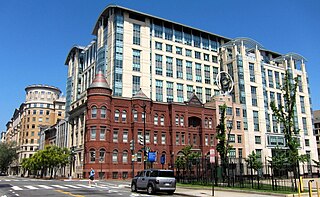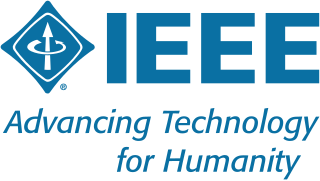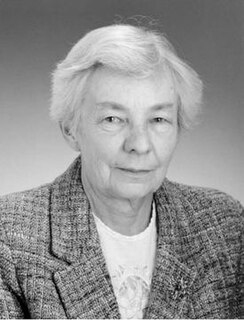The Association for Computing Machinery (ACM) is a US-based international learned society for computing. It was founded in 1947, and is the world's largest scientific and educational computing society. The ACM is a non-profit professional membership group, claiming nearly 100,000 student and professional members as of 2019. Its headquarters are in New York City.

Toxicology is a scientific discipline, overlapping with biology, chemistry, pharmacology, and medicine, that involves the study of the adverse effects of chemical substances on living organisms and the practice of diagnosing and treating exposures to toxins and toxicants. The relationship between dose and its effects on the exposed organism is of high significance in toxicology. Factors that influence chemical toxicity include the dosage, duration of exposure, route of exposure, species, age, sex, and environment. Toxicologists are experts on poisons and poisoning. There is a movement for evidence-based toxicology as part of the larger movement towards evidence-based practices. Toxicology is currently contributing to the field of Cancer research, since some toxins can be used as drugs for killing tumor cells. One prime example of this is Ribosome Inactivating Proteins, tested in the treatment of Leukemia.

The National Academies of Sciences, Engineering, and Medicine is the collective scientific national academy of the United States. The name is used interchangeably in two senses: (1) as an umbrella term for its three quasi-independent honorific member organizations the National Academy of Sciences (NAS), the National Academy of Engineering (NAE), and the National Academy of Medicine (NAM); and (2) as the brand for studies and reports issued by the operating arm of the three academies, the National Research Council (NRC). The NRC was first formed in 1916 as an activity of the NAS. Now jointly governed by all three academies, it produces some 200 publications annually which are published by the National Academies Press.

The Institute of Electrical and Electronics Engineers (IEEE) is a professional association for electronic engineering and electrical engineering with its corporate office in New York City and its operations center in Piscataway, New Jersey. It was formed in 1963 from the amalgamation of the American Institute of Electrical Engineers and the Institute of Radio Engineers.

The British Computer Society (BCS) is a professional body and a learned society that represents those working in information technology (IT) and computer science, both in the United Kingdom and internationally. Founded in 1956, BCS has played an important role in educating and nurturing IT professionals, computer scientists, computer engineers, upholding the profession, accrediting chartered IT professional status, and creating a global community active in promoting and furthering the field and practice of computing.
The Astronomical Society of the Pacific (ASP) is an American scientific and educational organization, founded in San Francisco on February 7, 1889. Its name derives from its origins on the Pacific Coast, but today it has members all over the country and the world. It has the legal status of a nonprofit organization.
The General Anthroposophical Society is an "association of people whose will it is to nurture the life of the soul, both in the individual and in human society, on the basis of a true knowledge of the spiritual world." As an organization, it is dedicated to supporting the community of those interested in the inner path of schooling known as anthroposophy, developed by Rudolf Steiner.

The Canadian Institute of Actuaries (CIA) is the national organization of the actuarial profession in Canada. It was incorporated on March 18, 1965. The FCIA designation stands for Fellow of the Canadian Institute of Actuaries. As the national organization of the Canadian actuarial profession, the CIA means to serve the public through the provision by the profession of actuarial services and advice by: representing the Canadian actuarial profession in the formulation of public policy; promoting the advancement of actuarial science and sponsoring programs for the education and qualification of CIA members and prospective members; ensuring that actuarial services provided by its members meet accepted professional standards; and assisting actuaries in Canada in the discharge of their professional responsibilities.

The Society of Petroleum Engineers (SPE) is a 501(c)(3) not-for-profit professional organization whose stated mission is "to collect, disseminate, and exchange technical knowledge concerning the exploration, development and production of oil and gas resources and related technologies for the public benefit; and to provide opportunities for professionals to enhance their technical and professional competence".
David Platt Rall was a cancer specialist and a leader in environmental health studies, whose work in environmental health helped turn it into a scientific discipline. Rall also advanced public health and prevention. He directed the National Institute of Environmental Health Sciences from 1971 to 1990, year in which he retired. His work on toxicology and carcinogenesis was recognized by his appointment as the first director of the National Toxicology Program in 1978. He held the rank of Assistant Surgeon General in the United States Public Health Service. He also chaired the World Health Organization's Program on Chemical Safety.

The Air Force Association (AFA) is an independent, 501(c)(3) non-profit, professional military and aerospace education association that promotes American aerospace power. It is headquartered in Arlington, Virginia.

The Libertarian Party of Connecticut is a statewide affiliate of the U.S. Libertarian Party. According to the bylaws posted on its web site, the Connecticut Libertarian Party has the basic aims of furthering individual freedom and opposing the initiation of force against individuals, among other things. It does this by engaging in political, educational, and social activities.

The Institute of Physics and Engineering in Medicine (IPEM) is the United Kingdom's professional body and learned society for physicists, engineers and technologists within the field of medicine, founded in 1995, changing its name from the Institution of Physics and Engineering in Medicine and Biology (IPEMB) in 1997. The Institute is governed by an elected Board of Trustees reporting to which are the Science, Research and Innovation Council and the Professional and Standards Council. The councils have operational responsibility for scientific and professional aspects of the Institute's work, respectively. Beneath the councils is a substructure of committees, groups and panels of members, which undertake the work of the Institute.
In the United Kingdom there are several hypnotherapy organisations. Each one has a Code of Ethics and Practice seeking to protect the public and maintain professional standards. Over the years, the number of hypnotherapy organisations has proliferated, often associated with particular training schools. There has been a notable lack of co-operation between organisations in establishing any agreed public standard of training and code of practice for the hypnotherapy profession as a whole. However, progress is now being made in this area.
The Society for Nutrition Education and Behavior (SNEB) is an American non-profit organization that represents the professional interests of nutrition educators in the United States and worldwide. The organization was founded as the Society for Nutrition Education in 1968 as a non-profit organization to publish the Journal of Nutrition Education. Once the Journal was established the Society expanded its purposes to include education, communication and research activities. The first issue of the Journal was published as Summer in 1969. The founding members of SNEB were: George M Briggs, PhD, Professor and Chair, Department of Nutritional Sciences, University of California at Berkeley; Ruth L. Huenemann, ScD, RD, Associate Professor of Public Health Nutrition, School of Public Health, University of California at Berkeley; George F. Stewart, PhD, Director, Food Protection and Toxicology Center, University of California at Davis; Hellen Denning Ullrich, MA, RD, Nutrition Specialist, Agricultural Extension Service, University of California Berkeley; Helen E. Walsh, MA, RD, Chief, Bureau of Nutrition, State Department of Public Health, Berkeley; and Gaylor P. Whitlock, PhD, Program Leader, Family and Consumer Sciences, Agricultural Extension Service, University of California Berkeley.
The National Council of Churches of Kenya (NCCK), is a fellowship of Protestant churches and Christian organisations registered in Kenya. It is currently Chaired by the Africa Brotherhood Church (ABC) Archbishop Dr. Timothy N. Ndambuki. Its motto is "For Wananchi" which means "for citizens" : This motto has been exemplified in NCCK's long involvement in public service, advocacy, and social responsibility in Kenya. It is a member of the Fellowship of Christian Councils and Churches in the Great Lakes and Horn of Africa and the Fellowship of Christian Councils in Southern Africa.
The American College of Toxicology (ACT) is a professional association dedicated to providing an interactive forum for the advancement and exchange of scientific information in the field of toxicology.

Mary Ochsenhirt Amdur was an American toxicologist and public health researcher who worked primarily on pollution. She was charged with studying the effects of the 1948 Donora smog, so she specifically looked into the effects of inhaling sulfuric acid by experimenting on guinea pigs. Her findings on the respiratory effects related to sulfuric acid led to her being threatened, to her funding being pulled, and to her losing her job at the Harvard School of Public Health in 1953. Undeterred by the setback, she carried on her research in a different role at Harvard, and subsequently at MIT and New York University. Despite the early controversy related to her work, it was used in the creation of standards in air pollution, and towards the end of her life she received numerous awards and accolades.
John Doull, was Professor of Pharmacology and Toxicology at the University of Kansas.
The British Toxicology Society has over 900 members who are based in over 40 countries. It is the National British professional association for toxicologists. The remit of the Society is to promote the advancement of the science of toxicology, for public benefit.










